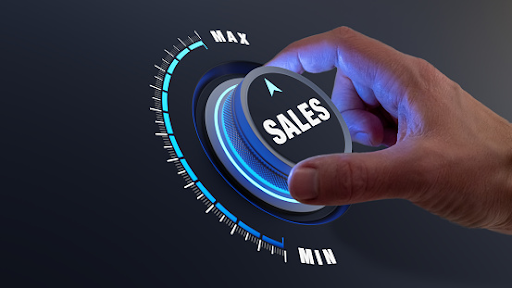Related Articles
Did you know this is true for your business too?
A few years ago, Facebook business pages started becoming all the rage. It seemed that new businesses were popping up left, right and centre.
Some worked, some didn’t. But they all helped lay the foundations for the current Facebook related ecommerce format. In the beginning, you could only open a page for your business, which looked a lot similar to fan pages, and then post about whatever goods or services you were selling.
This practice became so popular that Facebook eventually honed this application to the point where it’s just as commonplace as “real life” marketplaces now.
You can pay to have advertisements or posts about your products and services appear on people’s newsfeed now, as well as track logistics such as user interaction and page visits.
However, running the business is still on you. You keep tabs on your employees, your customer interactions, sales, inventory and so on, and at some point, it just becomes too much to handle.
The paperwork piles up, you lose track of employee contributions and, before you know it, you’ve lost all your hair and developed anxiety.
That is not to say that it can’t be done. Of course it can! Businesses have been running and expanding for ages! But let’s be honest, this is the 21st century. Why do something yourself when there is an app that can do it for you? Or a choice of several apps that can do it for you?
Whoever imagined you could one day run an entire business using mobile phone apps, right? But that is exactly what you can do now. You can download an app to keep track of your employees, interact with your customers, constantly and automatically update your inventory, and even do your tax calculations!
Before we dive into how that works and find out apps that suit your needs, let’s talk about what POS systems are.
A POS, or point of sale, system is basically the merging point where your back-end and front-end business transactions/interactions meet.
For instance, a POS system can help you take orders from customers, categorize and organize those orders, and tell you where each order needs to be sent and to whom.
Additionally, your system may also enable you to input the quantity of a certain product you send out and automatically deduct that number from your inventory, thus providing a setting where one look at the screen tells you which products you need to stock up on.
However, these systems are not exclusively software based, rather they tend to be combinations of software and hardware devices that come together to form a complete system that can make handling your business a smooth and enjoyable experience.
Apps that integrate such systems can work for any kind of business, starting from small businesses to corporate offices to ecommerce businesses. Say you set up a retail store with about 5 employees.
Upon making a sale, each employee inputs their name, the name of the product and quantity sold. At the end of the month, or day, you take a look at the overall output of each employee and see who is slacking off and who is setting a model example.
It also makes keeping tabs on your total sales easier. At the very least, easier than having to go through hundreds of bills and memos!
Now that we have an idea of how these systems work, let’s get right into apps that can help take your business transactions to the next level. Here are the top five most downloaded POS system apps on Google Play Store:
Android POS Systems
- Square Point of Sale – POS (over 10 million downloads)
- Quickbooks Accounting: Invoicing and Expenses (over 1 million downloads)
- Point of Sale Cash Register (over 500,000 downloads)
- Loyverse POS – Point of Sale (over 100,000 downloads)
- Shopify POS – Point of Sale (over 100,000 downloads)
Loyverse POS – Point of Sale
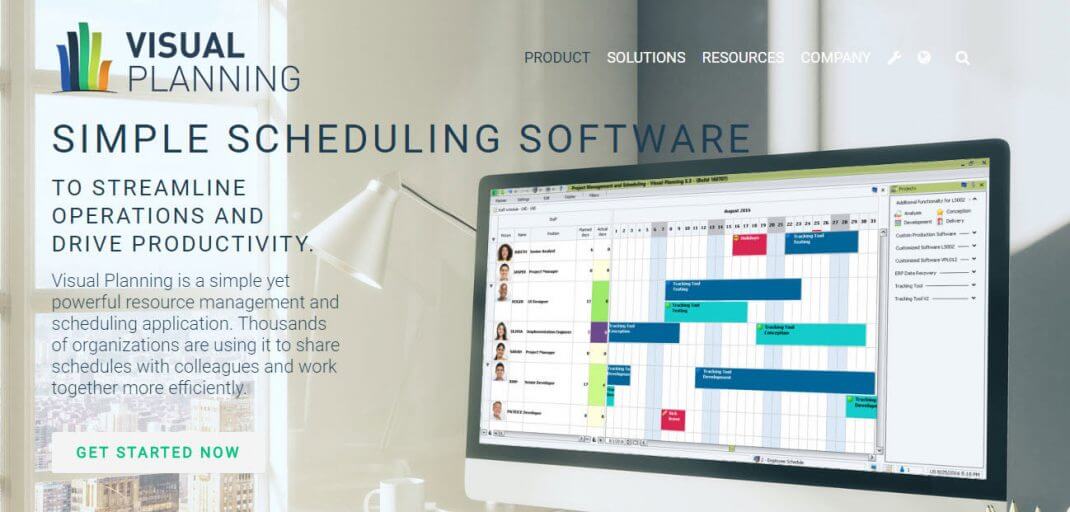
Loyverse POS is easily one of the most popular systems out there. It has a whole bunch of reviews on YouTube and over 100k downloads on the Play Store with an average rating of 4.7 out of 5. Around 97% of the reviews on this app are positive, with about 99% users recommending it to friends. In fact, if you search for POS systems on the Play Store, Loyverse is one of the first apps that show up on the recommendation feed.
Like any other POS app, Loyverse contains multiple features that can make your life easier.
One of the most prominent features of this app is that, unlike most of its competitors, Loyverse is mostly free. Sure, there are premium features that you can opt to pay for and external devices you can choose to buy, but overall the basic features of this app are free to use and can help you run your business without a hitch. Moreover, it is extremely user friendly and can be used across multiple devices such as smartphones and tablets.
Before we jump into the features of Loyverse, let’s do a quick review of how it works. Loyverse is perfect for small businesses. However, that does not mean it cannot be used in bigger settings. When you sign up for your business, you are given the option to choose the company size and the industry. The app will then help you personalize according to your needs. Once you are all set up, you can begin conducting and/or improving your business.
For example, say you own a small restaurant and you choose Loyverse to help run it. You can choose to set up a monitor in your office, one in the kitchen and some in the main dining area.
Customers can go through the menu on your device and place an order. The kitchen staff will then be able to access the order on their screen and send it out as soon as possible to the correct table.
So essentially, you will have three types of display – the back office display, the kitchen display and the customer display. Not only that, you will also be able to collect payment through the app.
You can choose to print out kitchen tickets and keep track of which table was served by whom. Moreover, at the end of the day, you can view your sales and performance logistics on the dashboard and use it to run an analysis on your business. This feature is very useful when it comes to strategizing and planning the future of your business.
Here is a list of features that Loyverse provides:
Point of Sale
- The freedom to use the app on a phone or a tablet.
- Features multiple payment methods
- Open tickets – enables the user to create and save orders which allows customers with the option to pay at their convenience.
- Discounts – user can choose to give customers discounts on their receipts
- Refunds – customers can also get refunds on their purchases
- List of items
- The option to modify existing items (add name, description etc.)
- Track cash transactions
- The option to work from multiple locations, across multiple devices
- Cloud connectivity
- Option to work offline (data will be automatically synced when the device is online again)
- Hardware: printer, barcode scanner, cash drawer.
- Customizable themes
Inventory Management
- Import Items
- Track inventory
- Adjust stock
- Get notifications when stock runs low
- Make plans to restock inventory
- Send orders to suppliers
- Manage vendor relationships
- Save stock receipts
- Transfer orders between your stores
- Keep track of end products and not just the raw materials used to make them
- Print barcode labels
- Inventory history
- Inventory report
- Inventory count (manually or using barcodes)
Employee Management
- Track employee performance based on sales by each employee
- Manage user access to sensitive information
- Smart management – make informed decisions based on workload and output
- Employees can clock in and out giving you the option to track their work hours
Sales Analytics
- Sales trend – compare sales from different days to identify changes
- Analyse the sales at the end of each shift and compare with cash received to identify discrepancies by employees.
- Keep receipt history to keep track of sales, discounts and refunds
- Tax report and tax calculations
- Create spreadsheets of data for analyses
Loyalty Program
- Create a customer database to analyse visits and sales in order to identify loyal customers
- Point reward program for regular and loyal customers
- Keep personalized notes on customers to remember preferences and small details in order to provide better service and improve relationships
Restaurant and Bar Features
- Kitchen printers
- Kitchen display – orders reach the kitchen directly without the need to waste paper
- Dining options – take out, dining in, home delivery
- Predefined tickets – assign table numbers to open tickets
Customer Communication
Customer display that allows the customer to go through the options, place order, view due amount. This display is separately viewable to the customer simultaneously as the sale takes place.
Payment Methods
- Credit Card
- Cash
- Wordplay (only available in the United States of America)
Support
- 24/7 live chat support
- Help Centre
- Visit the Loyverse website for tutorials, FAQs, articles and video guides
- Loyverse community – communicate with other users to share insights, discuss and solve problems, and build networks.
Loyverse, with its plethora of features, is a good option for customer oriented businesses such as restaurants or retail shops. However, it comes with a list of pros and cons.
Pros
- Easy to use
- Multiple features
- Affordable
- Aesthetic layout
- Compatible with multiple devices
- Cloud storage
Cons
- Some features only available in select countries
- Some features are only available on the IOS platform
Square Point of Sale – POS
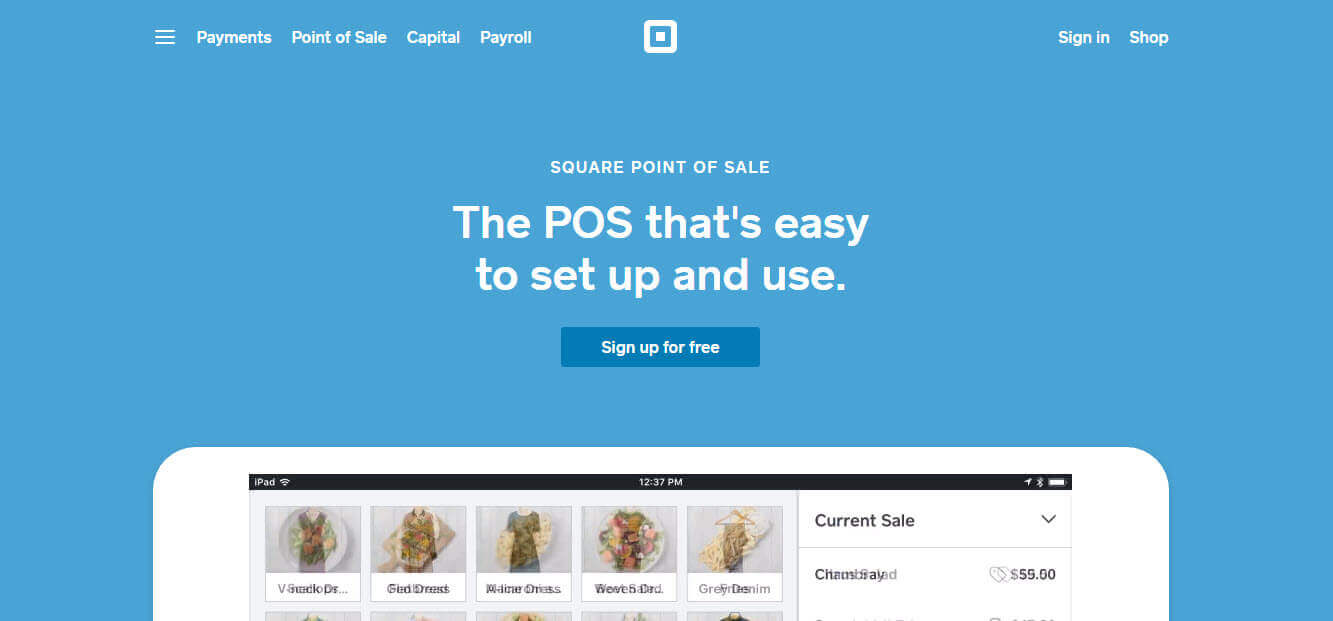
With more than 10 million downloads, Square POS is hands down the most frequently downloaded point of sale application. Square POS is free to download but does have a payment section within the app. For every monetary transaction you make, Square gets 1.75%. Moreover, there are multiple in-app purchases that can be made as required as your business progresses and grown.
Similar to Loyverse, Square also comes with its own hardware. However, Square is set on a slightly bigger scale than Loyverse and comes with significantly more perks and features.
For instance, with Square, users will be able to accept chip and PIN cards as well as mobile payments. In addition to that, customers will be able to sign receipts directly on your screen making paper receipts entirely redundant.
Moreover, it comes with a number of external hardware devices that can be bought from the website. These include the Square reader for contactless and chip payment, the Square terminal, the Square register and so on.
The Square Point of Sale app is unique in many ways. It not only helps you keep track of your business transactions, it also helps you in a number of other fields including marketing and payroll.
Using this POS app, you can easily create online marketing campaigns and track their reception and progress. You could then use the data to analyse and identify major key points in your business such as demographic and target audience, which would in turn allow you to personalize your campaign further.
Payroll is also a big factor in most businesses, regardless of how big or small the business is. A lot of time and money usually go into this sector in terms of salary calculations and distribution.
This is where the Square app comes in handy. Since it already comes with an employee management system similar to the Loyverse app, you can easily determine the amount of time and effort put in by individual employees and use it to calculate the salaries.
Moreover, it can help you to keep count of which employees are paid hourly, which are salaried and how many work on contracts. This feature, as well as the marketing one, requires payment, however.
Employee management and payroll features start at five dollars per month, whereas, marketing features start at fifteen dollars per month and loyalty features start at forty five dollars per month.
The Square app can help you save a lot of time and money while managing a business. You don’t have to worry about invoices as they can be made, sent and tracked digitally.
Moreover, if you’re worried about your data being stolen, this app is the right fit for you as it comes equipped with systems and protocols to protect your data against fraud or theft.
Additionally, the app directly interacts with your bank account. If a customer pays you through the app, the money will be deposited to your bank account as soon as the next day!
Here is a complete list of features provided by the Square POS:
- You can run multiple businesses with one account
- Track inventory in real time
- Fast deposits
- Secure payments
- Payments can be made in person, through your website, by invoice, on your computer and on multiple payment platforms
- Interactive dashboard that shows you all sorts of changes and stores all history so that you can make better decisions.
- POS and payment all in one place
- Customers can add tips directly while signing on your screen
- Useable with Square reader, debit card or credit card reader for android
- Receipt and kitchen ticket printer
- Barcode scanner
- Cash drawer
- Access real time sales data
- Customise your products by changing names and photos, and adding prices
- Employee management
- Payroll
- Customer loyalty programs
- Marketing
Another interesting thing about using Square is that you will be able to take out a loan of up to ten thousand dollars to improve and expand your business. It is relatively easy to apply for and has an organized and affordable payback method.
A portion of your card sales is deducted each time as payback for your loan. So you don’t even have to worry about paying back your loan as literally running your business will take care of it anyway. However, there is a flat fee that has to be paid and is automatically added to the total payable amount.
This POS system is by far the most reliable and user friendly of all the POS systems in the Play Store. Suffice to say, the pros of this system outweigh the cons.
Pros
- User friendly
- Reliable and trustworthy
- Data is kept safe
- Numerous exclusive features
- Easy to set up and use
- Multiple tutorials and helpful posts
- Huge community
Cons
- Support only works 12 hours a day
- Some options may be slightly confusing
- Mostly suitable for smaller businesses
Shopify POS
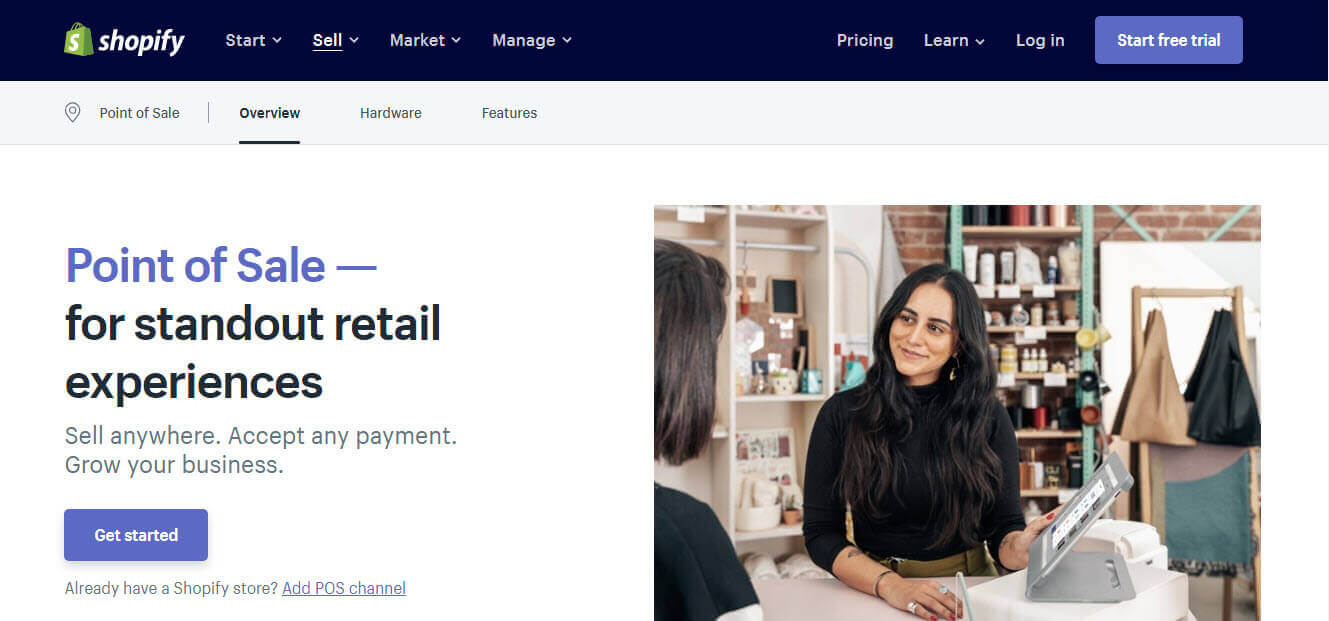
Shopify is one of the more precise POS applications on the market. Developed by Shopify Inc., this app has been downloaded more than one hundred thousand times and has an average user rating of 4 out of 5.
Shopify is a great app for business owners, especially those who sell in person or own online stores. Shopify is dynamic, easy to use and is divided into four separate sections with distinct features that can help you choose the one that’s best for you.
Initially, users have the option to try Shopify for 14 days, absolutely free of charge. After that, users have the option to choose between four different packages:
- Shopify Lite
- Shopify Basic
- Shopify
- Advanced Shopify
Before discussing the specific plans offered, let’s take a look at the general features that are provided by Shopify.
Features:
Payments
- Accepts credit cards
- Stores credit
- Custom payment types
- You can accept multiple types of payment in a single transaction
- Partial payments
- Gift cards
- Cards that are accepted: VISA, Mastercard, American Express, Discover, debit cards, gift cards (optional on user)
Checkout
- You can attach notes to individual orders to track special requests and details
- Shipping
- Taxes
- Accept orders anywhere using your device
- Email or print out receipts
- Custom Sale
Discounts
- Set up discounts
- Use discounts
- Track discounts
- Set up online promotions and apply them in person
- Rule based discounts
- Discount reports – analyse customer interaction, profits and overall reception of your discounts
Store Management
- Refunds (only available on Shopify and Shopify Advanced)
- Bookkeeping
- Accounting integration with Quickbooks, Xero etc.
- Tracking of order history
- Custom search by name of customer, product or date
- Monitor all cash registers and cash flow
- Timelines
- Daily Totals
- Staff PINs
Customer Management
- Customer profile
- Sync online and real life customers
- Online Marketing
Products
- Product organization
- Inventory management
- Barcode support
- Different types of products
- Shopify Apps
Hardware
- Barcode scanner
- Barcode printer
- Free credit card reader
- Free hardware shipping and returns
- Wi-Fi Camera
- Free receipt printer
Analytics
- Dashboard
- Retail report
- Product report
- Mobile dashboard
- Automatic synchronization of data
- Cloud storage
- Look up customer profiles to reach out over phone or email
Support
- 24/7 support
- Discussion forum
- Shopify help centre
- Ecommerce university
- Shopify experts
Pricing Plans
- Full commerce platform
- Flexible shopping
- Sales floor features – unlimited registers, app staff, staff PINs etc.
- Shopify shipping
- Multi locations:
- Up to 3 locations (Shopify Lite)
- Up to 4 locations (Shopify Basic)
- Up to 5 locations (Shopify)
- Up to 8 locations (Shopify Advanced)
Now that we have caught up on all the basic features provided by Shopify, we can look into the plan specific features:
Shopify Lite
Shopify Lite is the first of the options and is also the cheapest. It can be used for only nine dollars per month and only recommended for those who wish to sell in person or on social media, or those who sell on an already existing website.
Shopify Basic
For twenty nine dollars per month, users will get two staff accounts, unlimited number of products, unlimited file storage, and 24/7 support. Moreover, users will also get the chance to work at 2% transaction fees as well as avail various discount codes. In addition, users will get a free SSL certificate, manual order creation, and the opportunity to create a website and/or a blog.
Shopify
Users have access to all the features mentioned in the Shopify Basic section. Additionally, users will have access to five staff accounts, gift cards, professional reports and the services required to recover abandoned carts. Moreover, users will enjoy only 1% transactions fees and have access to fraud analysis reports. All of this for only seventy four dollars per month.
Shopify Advanced
For two hundred and ninety nine dollars per month, users will have access to all the perks and services mentioned in the Shopify Basic and Shopify plans as well as fifteen staff accounts, 0.5% transaction fees, third party calculated shipping rates and an advanced report builder.
Pros
- Dynamic
- Easily accessible
- Easy to use
- Good user interface
- Aesthetic layout
- Customization options
- Flexible plans
- Numerous feature
- Large community
- Large number of buyers and sellers
- Support
Cons
- Might be too expensive for beginners
- Not enough value for money
Quickbooks Accounting: Invoicing and Expenses
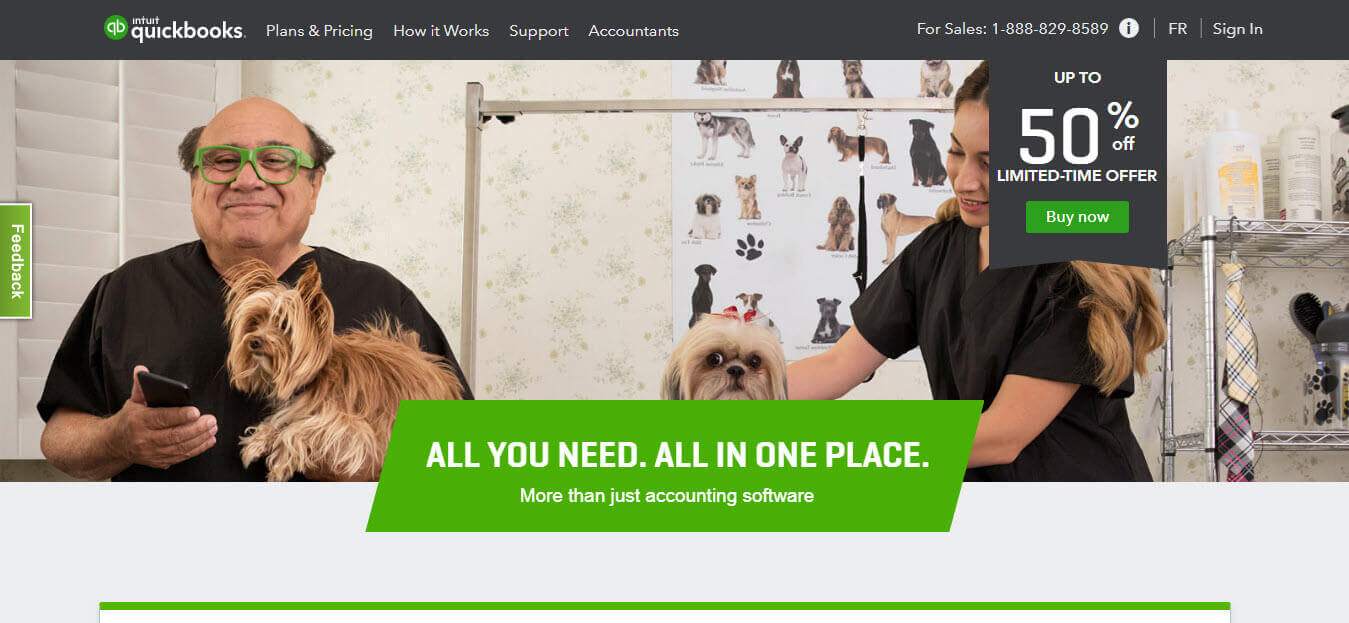
Quickbooks Accounting: Invoicing and Expenses is yet another POS software that makes your life easier by helping you handle your business transactions more efficiently.
It has been downloaded over one million time and has an average user rating of 4.3 out of 5. Like all the other POS apps, Quickbooks Accounting also has some common features such as invoicing and dashboard.
However, it is different from the others in the sense that it is not quite as “flashy” as Square or Loyverse, but has a more professional outlook. If bookkeeping and accounting are not your cup of tea, the Quickbooks software will become your go-to app.
It will save you time and money, as well as save you the trouble of having to hire someone to handle your expenses and keep your books.
Quickbooks, although free to download, is a paid service. You can, however, opt to go for the free 30-day trial to assess whether Quickbooks is the one for you.
This simple app comes with simple features such as:
- Customizable invoice templates
- Option to create your own invoice
- Send invoices online
- View whether recipient has received and seen the invoice
- Reminders on overdue invoices
- Manage your business on the go
- Access your account anywhere
- Compatible with phone, tablet and computer
- Track your expenses
- Organize and record your expenses to be calculated for taxes
- Create and send business forms
- Analyse dashboard reports to see how your business is doing
- Track profit and loss
- Take control of your cash flow
- Schedule recurring payments (such as bills) to save time
- Free unlimited support from developer
Pros
- Easy to use
- Convenient
- Affordable
- Straight forward
Cons
- Might look “boring” compared to the other more flashy apps
- Can have connection and syncing issues
Point of Sale Cash Register
Similar to the previously discussed apps, Point of Scaled Cash Register too has some typical features such as invoicing and record keeping. This app, developed by Meonria, has been downloaded more than five hundred thousand times. The average rating, however, is much lower than that of apps such as Square or Loyverse at only 3.8 out 5.
However, this app is perfect for beginners and small businesses. It can literally replace cash registers and is even perfect to use in makeshift stalls such as lemonade stands.
This app is also a great way to teach your children to manage their finances from an early age. In fact, many parents have downloaded this app as a “game” for their children in order to teach them about saving, documenting and tracking their finances.
Features include:
- POS system cash register
- “Buttons” – There are around 300 buttons that can be edited and assigned function to. For instance, for button 1, you can add name of the item, single price and barcode colour. This way, when you use it the next time, all you have to do is click on the button and all the information will automatically be added to the invoice.
- Bookkeeping
- Export – You can choose to export your invoices and sales revenue
Pros
- Extremely simple to use
- You can upgrade to “pro” version for only $9 (750 BDT)
- Doesn’t require tutorials
- Can be used in phone or tablet
- Printer can be connected via Bluetooth
- Great for pop up stalls
- Great for children
- Compatible with barcode scanner
- Can be used anywhere
Cons
- Too simplistic
- Is not compatible with card payments
- App has numerous bugs
- Buttons are barely visible
- The colour scheme is unappealing
- The overall app is not very aesthetic
- Cannot do tax calculations
- Is only suitable for extremely small businesses
- Not good for the long run
- Offers nothing except cash registry and bookkeeping
What is Odoo?
Odoo is a host for open source business apps that can meet every possible need of the user. Services include marketing, eCommerce, accounting, and inventory and so on and so forth. Odoo also provides a number of other services such as cloud platforms and training centre education.
Over three million users are currently using Odoo to boost their businesses. Being open source allows users to gain access to a whole world of customizations. However, one can also use the services without knowing how to code. Users have the option to use templates, drop down menus, and other effects to customize their page, product or service. Even websites can be built this way! And it’s all so easy to use! All tutorials and help documents can be found on the Odoo website.
Odoo provides a plethora of apps and services including:
- Accounting
- Project Management
- MRP
- CRM
- IoT
- Website builder
- Help desk
- Documents
- Email marketing
- eSignature
- Expenses
- Inventory
- Marketing automation
- Appointments
- Reports
- Sales
- Timesheets
- eCommerce
- Employees
- Employee management
- Point of sale
- Marketing
- Blogs
And the best part is, YOU get to pick and choose which features you want to integrate and use.
Other POS Systems Compared to Odoo
Odoo has a distinct advantage over other POS systems solely due to the fact that it brings all sorts of services together, while other POS service providers are limited to specific types. If we look into the differences between the aforementioned POS systems and Odoo, we will find that there are quite a few. However, given that they all a have certain features in common, there are a lot of similarities to be found as well.
Odoo VS Loyverse
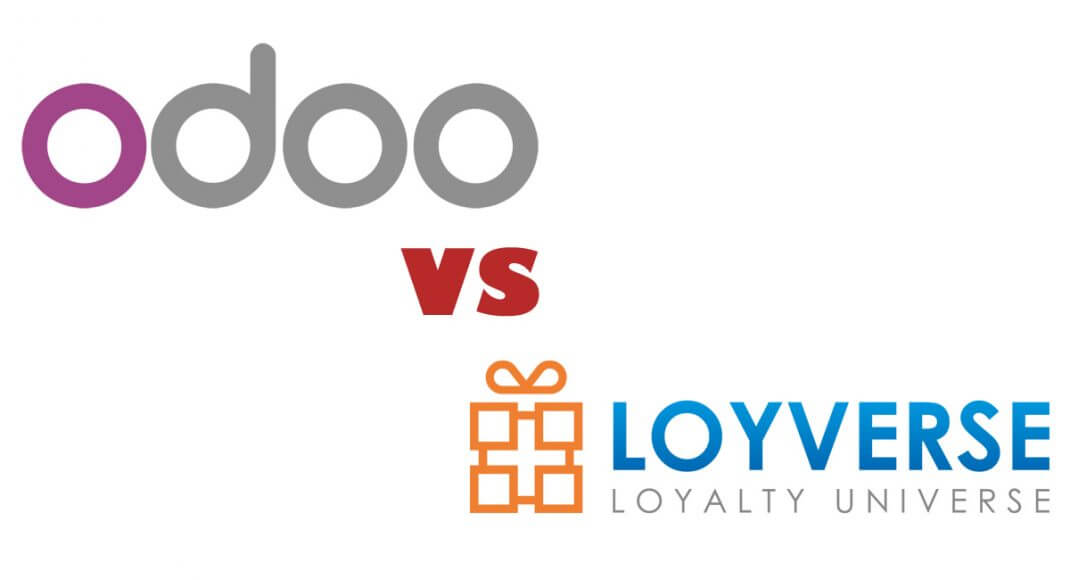
The biggest similarity between the two is that they are both web based. However, Loyverse is supported by both iPhone and Android apps, whereas Odoo is only web based. This gives Loyverse a slight advantage over Odoo in terms of mobility, accessibility and usability, On the other hand, neither platform is supported by Windows phones.
In terms of customer base, Odoo wins the battle hands down. Loyverse is only a plausible option for small to medium sized businesses (SMB’s). On the other hand, Odoo is the perfect platform for freelancers, small businesses, medium sized businesses, as well as large enterprises.
When it comes to support, Loyverse has a slight advantage over Odoo. Loyverse provides online support, video tutorials, as well as a wide range of knowledge resources. Odoo, on the other hand, only provides online support to its users.
Odoo POS is also a lot more expensive than Loyverse POS. Odoo POS starts from twenty dollars a month, whereas Loyverse can mostly be used for free. If users choose to upgrade to paid services, Loyverse POS starts from only 0.01 dollars a month! However, for both POS systems, users can create a free account with no credit card requirement. Moreover, users can also avail free trial services for both platforms and they are both subscription based.
Overall, users seemed to have preferred Loyverse over Odoo in terms of ratings. More users assigned a five star rating to Loyverse than to Odoo. Users have also stated that Loyverse is easier to use and has better customer support.
However, these ratings may well be based on the monetary factor. Given that Odoo requires users to pay a significantly higher amount than Loyverse, it would not be entirely unlikely for this to be a deciding factor.
Odoo VS Square Point of Sale
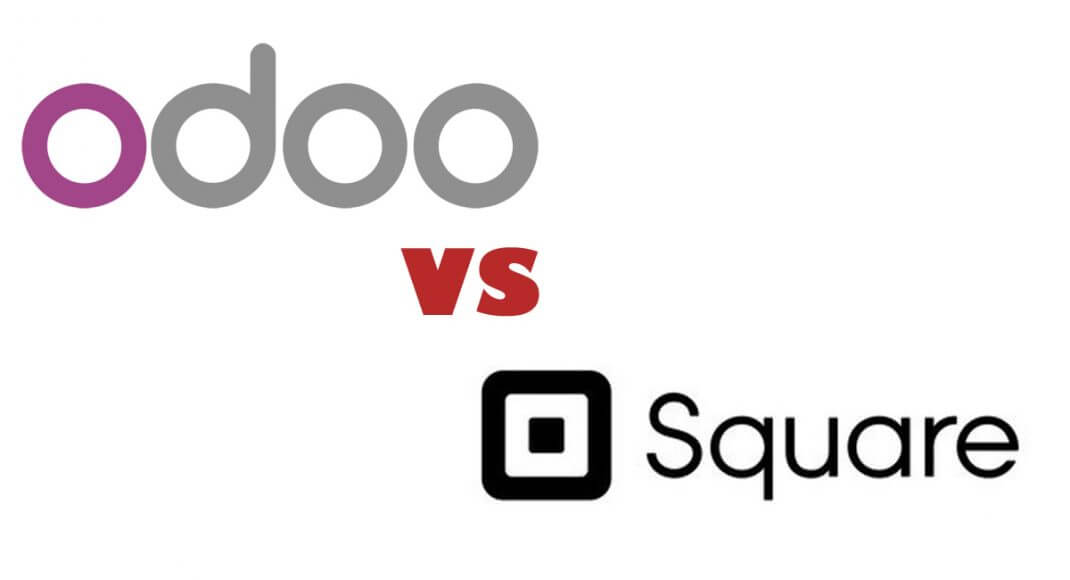
Similar to Loyverse, Square POS operates across the web, Android phones as well as iPhones. However, Odoo is exclusively web based.
In terms of customer base, Odoo has an advantage over Square, whereas Square has an advantage over Loyverse. Odoo is a haven for freelancers, small businesses, mid-sized businesses and enterprises. Square POS is capable of helping freelancers, small businesses and medium sized businesses. The only group left out of their services is that of enterprises.
In terms of support, Square wins over Odoo, but Loyverse wins over them both. Square does not provide video tutorials for their clients, but they do provide phone support, online support and a large knowledge base. Odoo again, only provides online support.
Square has another advantage over Odoo in the pricing department. Square is entirely free, whereas Odoo charges a monthly fee starting from twenty dollars once the free trial is over.
Odoo and Square are neck and neck in terms of user ratings. However, Square’s customer support reviews are slightly higher than that of Odoo’s. This could be owing to the fact that Odoo does not provide any support outside of online help.
Odoo VS Shopify
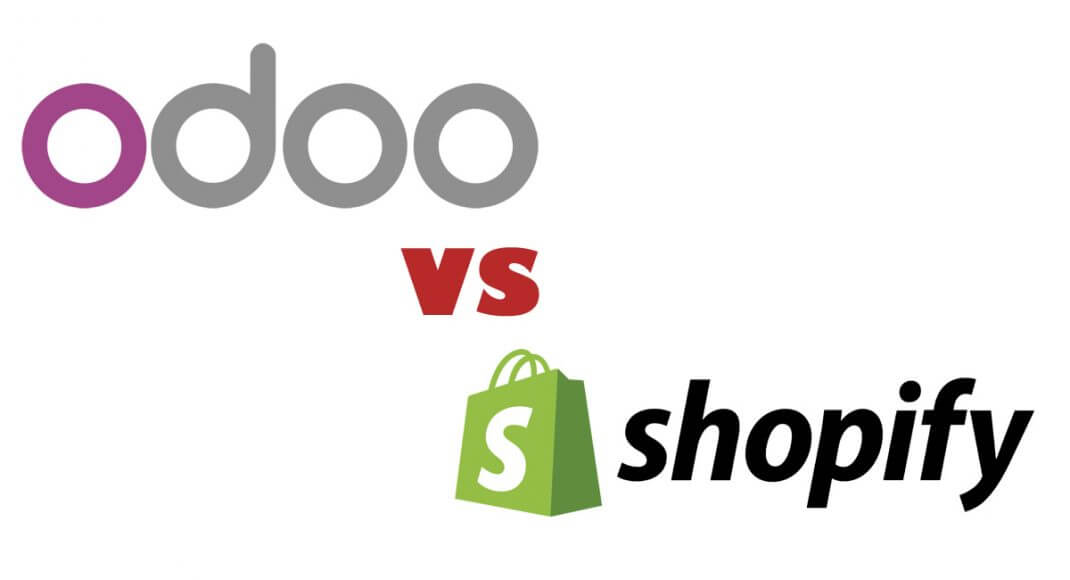
Once again, Shopify is supported by both web and mobile phone based applications, barring those of Windows phones. In the same place, Odoo is only supported by web based platforms.
Odoo and Shopify provide support to the same customer bases – freelancers, small businesses, medium sized businesses and enterprises.
Shopify provides all sorts of support to their users including video tutorials, online support, phone support as well as training and knowledge based support.
In terms of pricing, Shopify is more expensive than Odoo. Odoo subscriptions start from twenty dollars per month, while Shopify subscriptions start from twenty nine dollars per month. Although Shopify does have a package that costs nine dollars per month, the package, known as Shopify Lite, is of little to no help in terms business growth and development.
Odoo and Shopify have similar user ratings overall and in terms of ease of use, however Odoo has a higher rating when it comes to value for money. On the other hand, Shopify has Odoo beaten in terms of customer support ratings.
Odoo VS Quickbooks Accounting: Invoicing and Expenses
Similar to the other three POS systems, Quickbooks is also supported by web, Android and iPhone, leaving Odoo with only web based operations.
Both Odoo and Quickbooks support the same customers starting from freelancers to small businesses, and all the way up to enterprises.
Quickbooks provides phone support, online support, a huge knowledge base as well as video tutorials, compared to Odoo’s sole online support.
Quickbooks is significantly cheaper than Odoo, with prices being half of that of Odoo’s. Quickbooks’ subscriptions start from ten dollars per month while Odoo’s subscriptions start from twenty dollars per month. Both platforms offer free trial options with no credit card requirements. However, Quickbooks does not allow users to create a free account, while Odoo does.
The overall user ratings for both POS systems are more or less the same, with both receiving high ratings from users in all sectors except customer support.
Odoo VS Point of Scale Cash Register
Perhaps this is one round that Odoo wins hands down. While POS Cash Register is significantly cheaper than Odoo, it has very little to offer in terms of competition. The only plus side it has is that it runs in the form of an app while Odoo doesn’t. Odoo provides more in terms of options and functionalities than POS Cash Register, while the latter can only be used for bookkeeping and invoicing.
Conclusion – The Long Run
At first glance, it seems that the other apps have an advantage over Odoo. However, in the long run, Odoo can provide users with more accessibility and stability. Users will be able to pick and choose the services they wish to incorporate within their packages, be it POS or marketing or bookkeeping. The other systems, however, are strictly POS based. In terms of cost comparisons, if long term payments are considered, Odoo is a more feasible option since users will only be paying for the services they want to use, whereas for the other apps, they would be paying for the whole package regardless of which features they use. It would, therefore, be more practical and reasonable to choose Odoo over the others.



